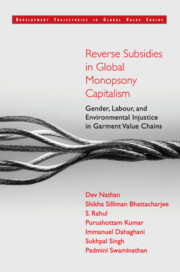 Reverse Subsidies in Global Monopsony Capitalism
Reverse Subsidies in Global Monopsony Capitalism Published online by Cambridge University Press: 21 January 2022
While Chapter 5 explained the structural reproduction of extractive labour subsidies, this chapter directs attention to the day-to-day industrial relations practices that facilitate labour subsidies. How are labour subsidies extracted from women workers? What are the industrial relations practices used to discipline women workers into working beyond their physical capacity in an industry where they have no long-term employment security? Across garment supply chains, labour subsidies are enforced through routine and entrenched practices of gender-based violence and harassment (GBVH) that function as a mode of supervision within hierarchical workplaces, structured along gender lines. This chapter provides a framework for understanding GBVH in the garment industry as not simply a factory-level problem but rather an industry-wide culture of violence sustained at the intersection of gendered ideologies and social relations, and brand purchasing practices driven by fast-fashion trends and pressure to reduce costs.
Women workers on Asian garment production lines face a spectrum of violence (Table 6.1). Sexual harm, stigmatization, and industrial discipline practices perpetrated against women garment workers are at once locally specific and also part of escalating patterns of violence documented across garment supply chains. Women workers may be targets of violence on the basis of their gender, or because they are perceived as less likely or able to resist. Comprising the majority of workers in garment supply chains in Asia and globally, women workers are also disproportionately impacted by forms of workplace violence perpetrated against both women and men (AFWA et al. 2018a–c).
The spectrum of violence described in this chapter is based upon accounts of gender-based violence on garment supply chains from 150 garment workers employed in 37 factories from across Bangladesh, Cambodia, India, Indonesia, and Sri Lanka. These accounts, collected by the Asia Floor Wage Alliance (AFWA) between January and May 2018, include reports of sexual harm and suffering and gendered industrial discipline practices, including physical violence, verbal abuse, and threats of retaliation for resisting abuse. In order to contextualize cases and types of violence reported by women workers, we conducted in-depth factory profiles of 13 garment supplier factories in Bangladesh, Cambodia, and India that aimed at locating patterns of violence in relation to the distribution of workers by gender across departments and roles.
To save this book to your Kindle, first ensure [email protected] is added to your Approved Personal Document E-mail List under your Personal Document Settings on the Manage Your Content and Devices page of your Amazon account. Then enter the ‘name’ part of your Kindle email address below. Find out more about saving to your Kindle.
Note you can select to save to either the @free.kindle.com or @kindle.com variations. ‘@free.kindle.com’ emails are free but can only be saved to your device when it is connected to wi-fi. ‘@kindle.com’ emails can be delivered even when you are not connected to wi-fi, but note that service fees apply.
Find out more about the Kindle Personal Document Service.
To save content items to your account, please confirm that you agree to abide by our usage policies. If this is the first time you use this feature, you will be asked to authorise Cambridge Core to connect with your account. Find out more about saving content to Dropbox.
To save content items to your account, please confirm that you agree to abide by our usage policies. If this is the first time you use this feature, you will be asked to authorise Cambridge Core to connect with your account. Find out more about saving content to Google Drive.